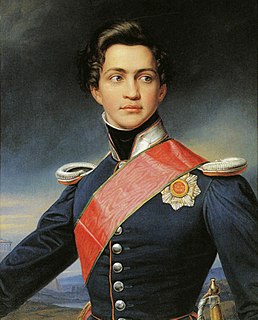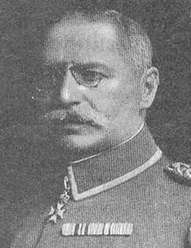Biography
Spies was born in Ansbach. After holding several officer positions in the Bavarian army, also in Greece, which was governed by prince regent Otto, and in the federal war ministry of the Frankfurt Parliament, in 1859 he was promoted Major General in the Generalquartiermeister's staff. In 1860 he was given the command of the genie troops. Spies served as war minister of the Kingdom of Bavaria from June 12 to December 11, 1861 and from June 16 to October 10, 1862 (his death). He died in Munich. [2]

Ansbach is a city in the German state of Bavaria. It is the capital of the administrative region of Middle Franconia. Ansbach is 25 miles (40 km) southwest of Nuremberg and 90 miles (140 km) north of Munich, on the Fränkische Rezat, a tributary of the Main river. In 2004, its population was 40,723.

Greece, officially the Hellenic Republic, also known as Hellas, is a country located in Southern and Southeast Europe, with a population of approximately 11 million as of 2016. Athens is the nation's capital and largest city, followed by Thessaloniki.

Otto was a Bavarian prince who became the first modern King of Greece in 1832 under the Convention of London. He reigned until he was deposed in 1862.
This page is based on this
Wikipedia article Text is available under the
CC BY-SA 4.0 license; additional terms may apply.
Images, videos and audio are available under their respective licenses.

General Otto Hermann von Lossow was a Bavarian Army and then German Army officer who played a prominent role in the events surrounding the attempted Beer Hall Putsch by Adolf Hitler and the Nazi Party in November 1923.

Franz Xaver Ritter von Epp, from 1916 Ritter von Epp, was a German general and politician who started his military career in the Bavarian Army. Successful wartime military service earned him a knighthood in 1916. After the end of World War I and the dissolution of the German Empire, von Epp was a commanding officer in the Freikorps and the Reichswehr. He was a member of Bavarian People's Party, before joining the Nazi Party in 1928, when he was elected as a member of the German parliament or Reichstag, a position he held until the fall of Nazi Germany. He was the Reichskommissar, later Reichsstatthalter, for Bavaria.

The Bavarian Military Merit Order was established on July 19, 1866 by King Ludwig II of Bavaria. It was the kingdom's main decoration for bravery and military merit for officers and higher-ranking officials. Civilians acting in support of the army were also made eligible for the decoration. The Military Merit Order ranked below the Military Order of Max Joseph (Militär-Max-Joseph-Orden), which was Bavaria's highest military honor for officers.

Eugen Siegfried Erich Ritter von Schobert was a German general during World War II. He commanded the 11th Army during Operation Barbarossa, the invasion of the Soviet Union. Schobert died when his observation plane crashed in a Soviet minefield.

The Military Order of Max Joseph was the highest military order of the Kingdom of Bavaria. It was founded on 1 January 1806 by Maximilian I Joseph of Bavaria, the first king of Bavaria. The order came in three classes:

Otto Ritter von Dandl was the last Minister-President of the Kingdom of Bavaria.
The Royal Bavarian Infantry Lifeguards Regiment was a household-lifeguard (bodyguard) regiment of the Bavarian kings from the end of the Napoleonic Wars until the fall of the Wittelsbach monarchy and the subsequent disbanding of the Bavarian army.
Carl also Karl Romanus von Weishaupt was a Bavarian lieutenant general and War Minister under Maximilian II of Bavaria from 5 April to 21 November 1848.
Ludwig von Lüder was a Bavarian Major General. He was War Minister under Maximilian II of Bavaria for two times.
Wilhelm Ritter von Manz was a Bavarian Lieutenant General and War Minister under Maximilian II of Bavaria from April 13, 1859 to June 12, 1861.
Hugo, Ritter von Bosch was a Bavarian Lieutenant General and twice served as Acting War Minister for under Maximilian II of Bavaria.
Eduard Ritter von Lutz was a Bavarian Major General and War Minister under Maximilian II of Bavaria and under Ludwig II of Bavaria.

Joseph Maximilian Fridolin Ritter von Maillinger was a Bavarian General der Infanterie and War Minister under Ludwig II of Bavaria.

Adolf Ritter von Heinleth was a Bavarian General der Infanterie and War Minister under Ludwig II of Bavaria and under Otto of Bavaria.

Benignus Ritter von Safferling was a Bavarian General der Infanterie and War Minister under Otto of Bavaria.

Philipp von Hellingrath was a Bavarian General der Kavallerie and the last War Minister under Ludwig III of Bavaria.

Oskar Ritter und Edler von Xylander was a Bavarian General der Infanterie, at last commanding the I Royal Bavarian Corps until his retirement in 1918.
Hans Ritter von Hemmer,, son of Colonel Anthony Hemmer, was an officer in the Royal Bavarian Army and Knight Commander of the Military Order of Max Joseph.

Karl Ritter von Fasbender was a Bavarian General der Infanterie who served as a corps commander throughout World War I and briefly commanded an army at the end of the war.
Spies is a surname of German origin, and may refer to:
















